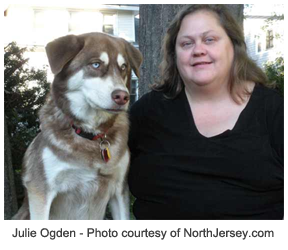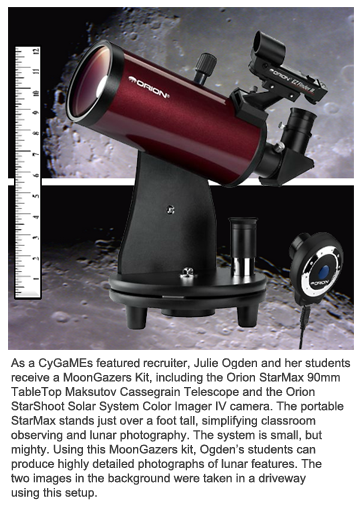
Teacher Blazes a Recruiting Path for Game Research
Wed Jul 18 2012
Read Julie Ogden's Selene testimonial and New Jersey state standards summary.
 For Julie Ogden the road to becoming a featured recruiter for the award-winning Selene videogame was simply putting the game in context for her students.
For Julie Ogden the road to becoming a featured recruiter for the award-winning Selene videogame was simply putting the game in context for her students."Two weeks before we started the Selene project," Ogden recounted, "I really talked it up with the kids, telling them it was a unique opportunity. They would be participating in groundbreaking research, a game designed by the top scientists in the country."
And with that sales pitch to her sixth grade science students at Woodcliff Lake Middle School in Woodcliff Lake, NJ, Ogden found an eager audience.
"The excitement level of the children as they learned was unbelievable. They raced into the room to log on to Selene, and while they were not allowed to talk about the actual game, there were excited outbursts every time they achieved a high score," Ogden said.
"Many students continued to play at home to see if they could obtain that completion card. The students loved the challenge and were super motivated to master this learning. This was a great experience!"
The CyGaMEs team at the Center for Educational Technologies, which manages the game, is recognizing Ogden as a featured recruiter for her efforts in bringing players to Selene and promoting its efforts to study how and when people learn while playing videogames. Ogden has recruited more than 100 players for Selene so far, but the recognition comes from having more than 90 percent of them complete the game. She looks forward to bringing more players aboard this school year.
Selene: A Lunar Construction Game was funded by NASA to study how to best use videogames in the teaching of NASA science concepts. The game is now part of the National Science Foundation-funded CyGaMEs project, an approach to instructional game design and embedded assessment.
The Selene game is free online and available 24-7. Players ages 9-18 and adult recruiters, who confirm players' ages, get parental consent and gather other players, are always needed to help with the CyGaMEs research. To sign up as a recruiter or play Selene, visit the Selene website or contact Selene.
The game, indeed, features the work of three accomplished scientists. Debbie Denise Reese, senior educational researcher at the Center for Educational Technologies and principal investigator for the project, created the assessment and instructional concepts of Selene and has earned national awards for the game's design. Chuck Wood, director of the center, is a renowned lunar scientist who spent years with NASA training shuttle astronauts on lunar observation, and he also operates the Lunar Photo of the Day website. He guides players through Selene in a series of video segments that explain the Moon's geological history. And Barbara Tabachnick, professor emerita of psychology at Cal State Northridge, has served as a consultant throughout the project. She recently earned the lifetime achievement award from the Western Psychological Association for her 40 years as a research design/statistical consultant.
In Selene players learn difficult geological concepts like accretion, differentiation, impact cratering and volcanism by applying these science concepts to help players move toward the game's goal of building the Earth's Moon. Players construct the Moon, then pepper it with impact craters and flood it with lava to experience how our Moon formed and changed over time. All through the game Selene tracks each player's behavior to measure learning and the player's response to the game environment.
Ogden, who has taught at Woodcliff Lake for 10 years, said the game has been perfect for her students, and she plans to continue incorporating it into her classes. It ties in well with some other lunar activities she uses.
 "When we began the game, the students were simultaneously involved with the NASA GRAIL MoonKAM, which allowed them to pick areas of the Moon for NASA to photograph and post," Ogden said. "I also immersed them in Moon lore, from legends to pop songs, to increase the excitement."
"When we began the game, the students were simultaneously involved with the NASA GRAIL MoonKAM, which allowed them to pick areas of the Moon for NASA to photograph and post," Ogden said. "I also immersed them in Moon lore, from legends to pop songs, to increase the excitement."She scheduled the computer lab for play and did not assign homework during the Selene week so that students had time to complete the game at home.
"While I enforced that the students could not discuss the game, I did encourage competition over points earned and game completion time. We dedicated a bulletin board in our classroom to list the students who completed the game first. There was a second board to list our high scorers. Students who scored over 4,000 got their completion card laminated and acknowledged in class. Our one high scorer who made the leaderboard had his picture put in the local newspaper (with Selene information included for other teachers in the area)."
For the rest of the school year whenever students had free time, they were allowed to use the class computers to play Selene.
Ogden, who says science really sparks her curiosity and likes to make it "come alive" for students, was a semifinalist in 2011 for New Jersey for the Presidential Award for Excellence in Math and Science Teaching.
Reese says that great progress in cyberlearning research has been made thanks to the Selene game and recruiters like Ogden who sign up players.
"We're on the cutting edge of cyberlearning using instructional games with this project," Reese said. "The technology we've developed in Selene to assess when players are learning a concept—we can now tell the exact moment when learning occurs, in fact—addresses the agenda set by the U.S. Department of Education in its 2010 National Education Technology Plan. They've asked for it—we're actually doing it here at Wheeling Jesuit. That research can't take place without players signing up to take part in Selene, and we truly appreciate the efforts of people like Julie."
Selene has twice earned the Association for Educational Communications and Technology Design and Development Best Practice Award, in 2008 and again in 2011. In 2010 Selene was one of 15 finalists worldwide in the Disney Research Challenge, a competition that seeks to show that sophisticated concepts can be conveyed via entertaining interactions on computers.



